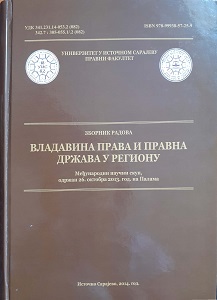Подаци и информације у пореском поступку и правна сигурност у Републици Србији
Data and Information in the Tax Procedure and Legal Certainty In Republic of Serbia
Author(s): Gordana Ilić-Popov
Subject(s): Law, Constitution, Jurisprudence
Published by: Правни факултет Универзитета у Источном Сарајеву
Keywords: Commissioner for Information of Public Importance;Data protection;Data privacy;Legal Certainty;Official secrecy;Personal data;Tax information;Tax procedure;
Summary/Abstract: In the field of taxation data and information play a key role because they enable assessment of the tax liability, as well as collection of taxes. But it is very important to properly balance the relationship between the requirement for the provision of public funds and the need to protect the taxpayer’s interests. In this paper the author will point to data that are relevant for taxation, with special emphasis on the personal data of the taxpayer. However, the tax authority shall not demand information from the taxpayer which is not necessary for the determination of tax or tax control. Data in the tax procedure are considered to be confidential, so they are available only to the authorized persons participating in the tax procedure, tax infringement procedure or the criminal proceedings. Therefore, one of the main principles of the tax law derived from the constitutional principle of the rule of law is also the principle of confidentiality of tax information, established in the Serbian Law on Tax Procedure and Tax Administration as the principle of official secrecy in tax procedure. However, the author highlights that some data are not deemed confidential and their disclosure does not violate the above-mentioned principle. From the standpoint of the legal certainty in the Republic of Serbia, the author examines the legal obligation of the tax administration to quarterly publish information on tax liabilities of taxpayers on its website, having in mind also the relevant provisions of the non-tax laws, such as the Law on Personal Data Protection and the Law on Free Access to Information of Public Importance. Finally, the author concludes that, along with the development of modern information technologies, the possibilities of data abuse and violation of taxpayer’s privacy have significantly increased. Hence, she points out the necessity of the physical data protection. In case when tax officer publishes data which are the official secret, thus causing damage to the taxpayer, he can achieve legal protection in the court proceedings. In addition, one should not neglect the role of the Commissioner for Information of Public Importance and Personal Data Protection, who supervises the implementation of data protection.
- Page Range: 871-891
- Page Count: 21
- Publication Year: 2013
- Language: Serbian
- Content File-PDF

